Key takeaways
- Opera music projects create immersive experiences through the collaboration of various artistic elements like music, drama, and design.
- Luciano Pavarotti redefined the tenor role in opera with his powerful yet warm voice, making the art form more accessible through innovative performances and crossover events.
- Pavarotti’s legacy highlights the importance of emotional depth in performance and the power of connecting with diverse audiences, encouraging modern artists to blend tradition with innovation.
- Key lessons from Pavarotti include the value of making opera approachable, the impact of passion in artistic collaboration, and the need for authenticity in musical expression.
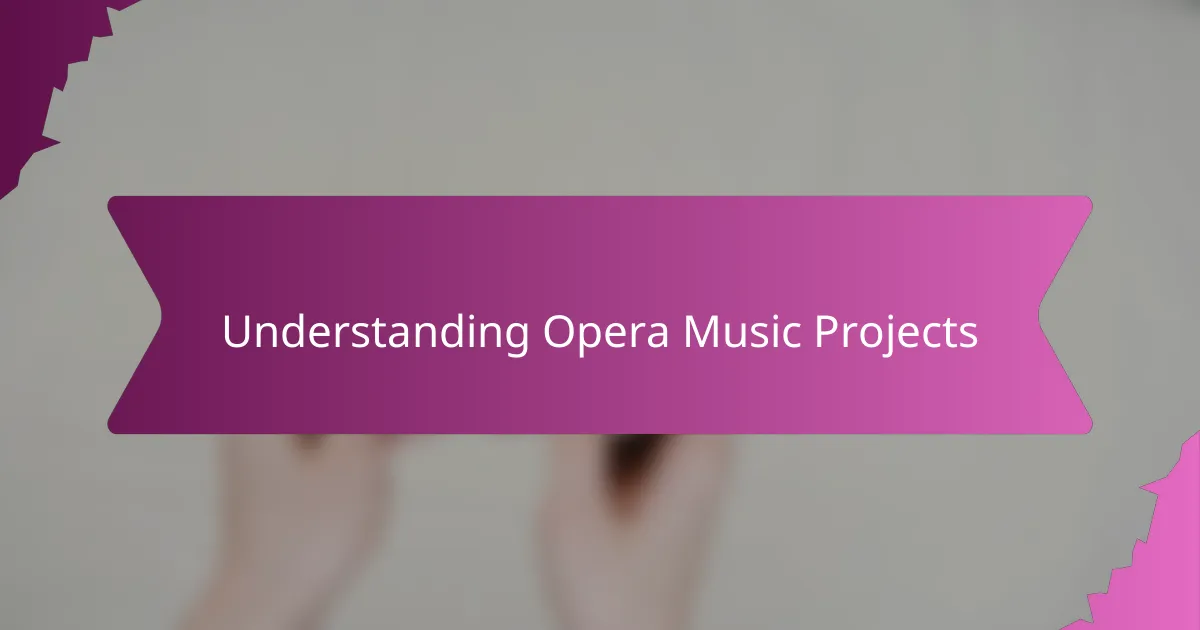
Understanding Opera Music Projects
Opera music projects are fascinating because they bring together so many elements—music, drama, design—into one immersive experience. From my perspective, it’s like stepping into a living painting, where every note and gesture tells a story beyond words. Have you ever noticed how these projects require a blend of precision and passion to truly come alive?
Working closely with opera projects, I’ve seen firsthand how collaboration shapes the final performance. The singers, musicians, directors, and designers create a delicate balance that feels both technical and emotional. I often wonder how much energy goes into rehearsals before the audience even hears a single note.
What strikes me most is how opera projects can reinvent old stories in fresh ways. They challenge both artists and audiences to explore new interpretations while honoring tradition. This constant push and pull keeps the art form vibrant and alive, don’t you think?
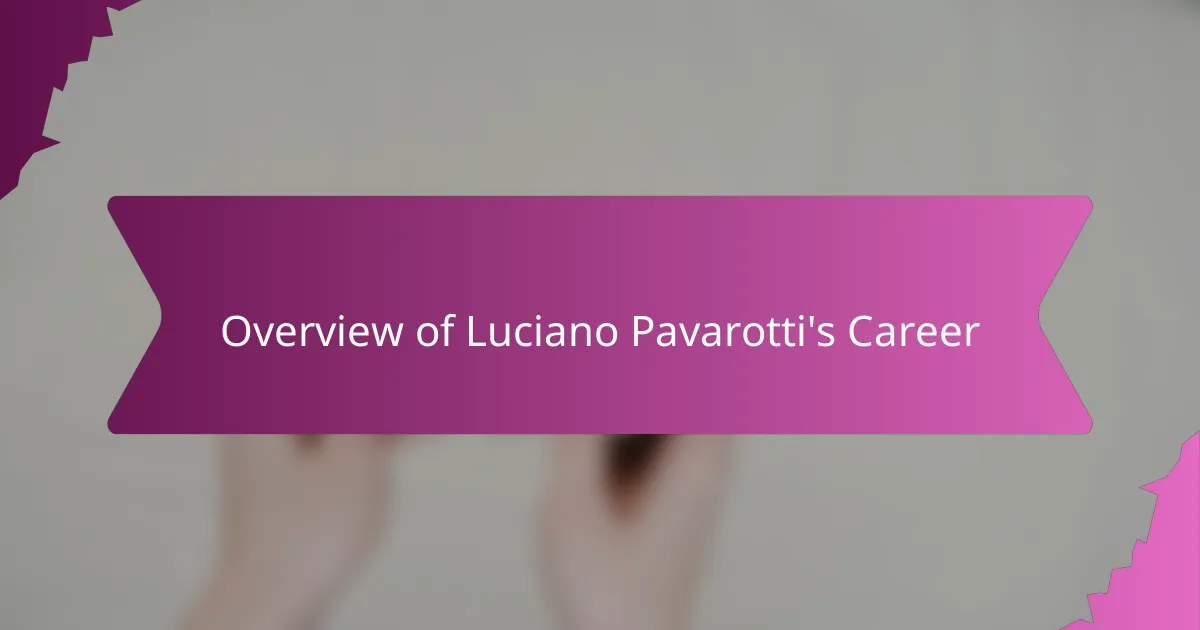
Overview of Luciano Pavarotti’s Career
Luciano Pavarotti’s career, to me, is nothing short of legendary. Starting from humble beginnings in a small Italian town, his rise to international stardom felt almost like a fairytale. Have you ever listened to his voice and felt that rare combination of power and warmth? That unique quality is what made him a beloved figure worldwide.
I remember the first time I heard Pavarotti live on a recording—it was transformative. His ability to convey deep emotion through his tenor, while maintaining impeccable technique, set a new standard in opera. It’s clear to me why his performances in operas like “La Bohème” and “Turandot” remain iconic decades later.
What fascinates me is how Pavarotti didn’t just focus on opera houses; he brought opera to the people. His involvement in concerts like The Three Tenors made this complex art form accessible and exciting to a broader audience. Doesn’t that make you wonder how much impact one artist can have in reshaping perceptions about classical music?
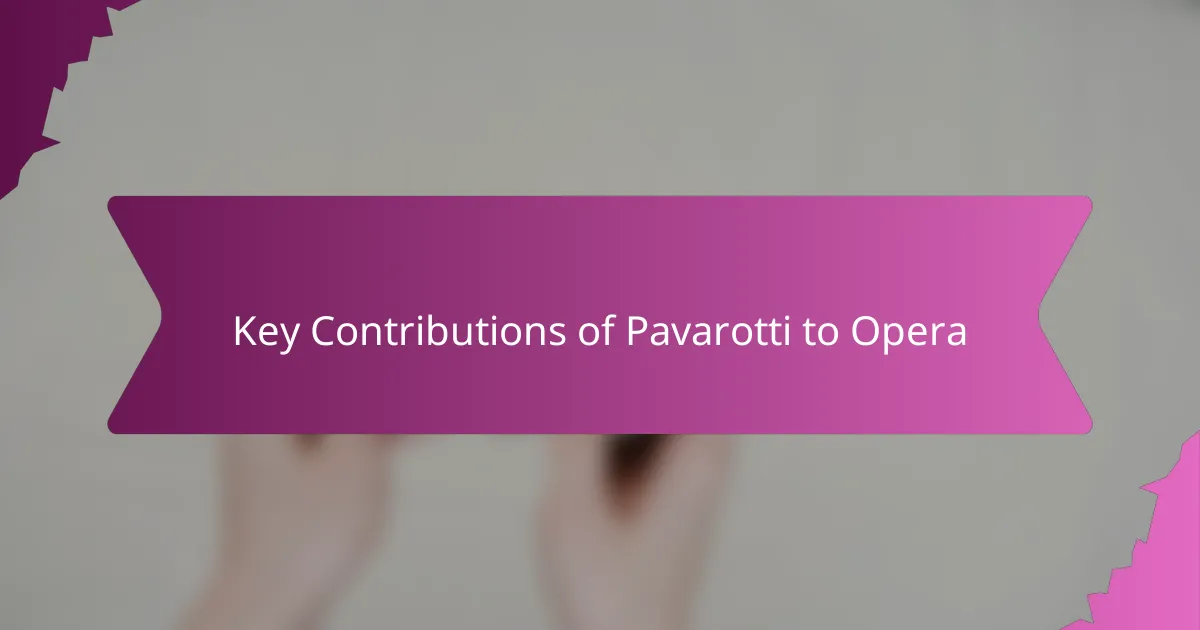
Key Contributions of Pavarotti to Opera
Pavarotti’s key contribution to opera, in my view, lies in how he redefined the tenor role with sheer vocal brilliance and emotional depth. His voice wasn’t just powerful; it was inviting, making audiences feel every word and nuance. Have you ever experienced an opera performance where the singer’s voice seems to reach right into your heart? That’s what Pavarotti did effortlessly.
What I find remarkable is his knack for blending technical mastery with genuine warmth. Many tenors focus purely on technique, but Pavarotti’s singing felt alive and human. I recall a performance where his high notes seemed to soar without strain—an achievement that demands years of discipline, yet he made it sound so easy and natural.
Beyond the stage, his efforts to popularize opera through crossover events truly changed the game. Bringing opera stars out of traditional theaters and into stadiums was bold and transformative. It makes me reflect on the power of innovation in preserving classical art forms—how Pavarotti’s vision brought opera into the modern era without losing its soul.
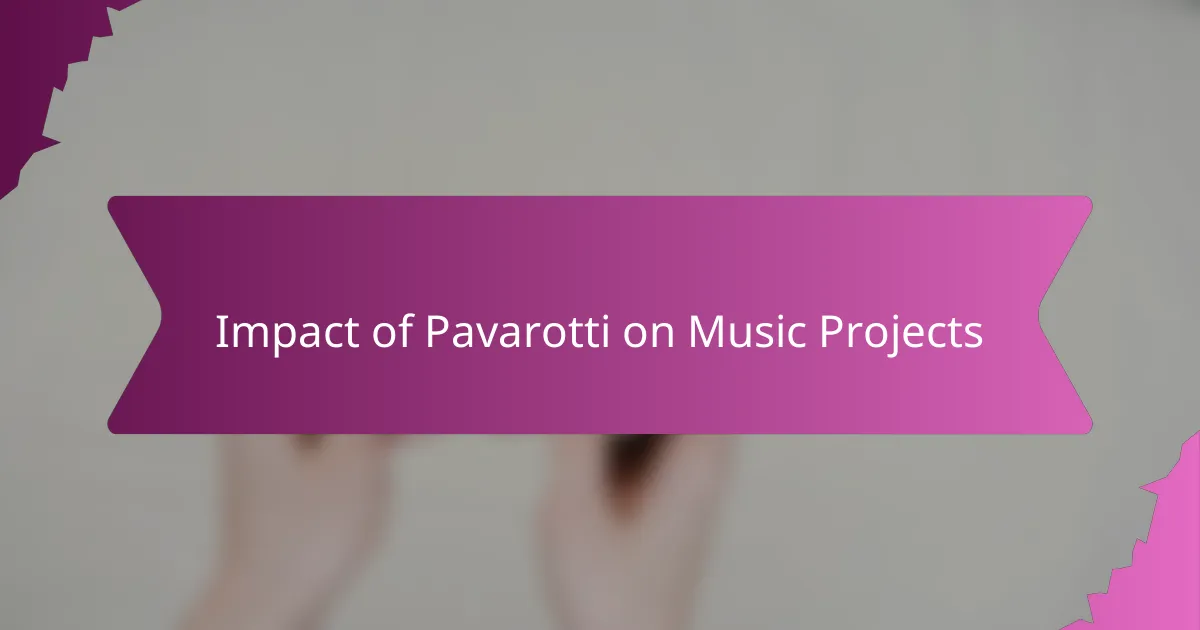
Impact of Pavarotti on Music Projects
What truly stands out to me about Pavarotti’s impact on music projects is how he elevated the collaboration between artists. Having observed many projects, I notice that when a performer brings that kind of passion and precision, it sparks a whole new energy in rehearsals and performances. Don’t you think that kind of inspiration can push everyone involved to achieve something extraordinary?
I also feel that Pavarotti’s approach changed the way music projects think about audience connection. His warmth and accessibility made me realize that music projects can reach beyond traditional boundaries, inviting a broader and more diverse audience to appreciate opera. How often do you see a classical music event that feels welcoming rather than intimidating? Pavarotti showed us it’s possible.
Finally, from my experience, Pavarotti’s legacy has encouraged many music projects to blend tradition with innovation. His career reminds me that honoring the roots of opera doesn’t mean staying stuck in the past; it’s about finding fresh ways to make the art form live and breathe today. Could this be the essential lesson for anyone working on a music project now? I believe it is.
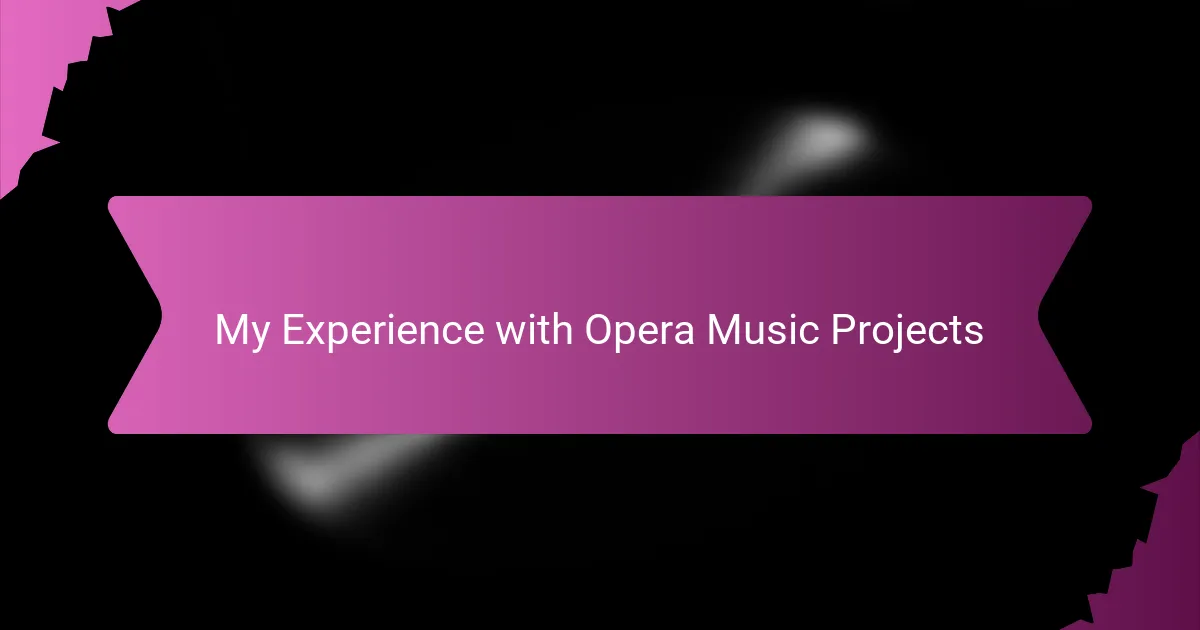
My Experience with Opera Music Projects
Working on opera music projects has been a journey filled with surprises for me. I recall one rehearsal where a simple phrase from Pavarotti’s repertoire instantly lifted the entire team’s spirit—there’s something magical about how opera can unify people around a shared passion. Have you ever noticed how a single powerful moment can change the entire atmosphere in a room?
I found that diving into opera projects demands patience and an openness to storytelling beyond words. Sometimes, I’d catch myself moved by the subtle interplay of music and emotion long before the final scene, proving to me that opera is truly a living, breathing art. Doesn’t that make you appreciate the depth behind every performance?
What’s stood out most in my experience is how opera music projects challenge you to balance precision with raw feeling. It’s a constant dance between technical skill and heartfelt expression, and that tension is what makes the whole experience so rewarding. Have you ever felt that mix of nerves and excitement before a big performance? That’s exactly where the magic happens.
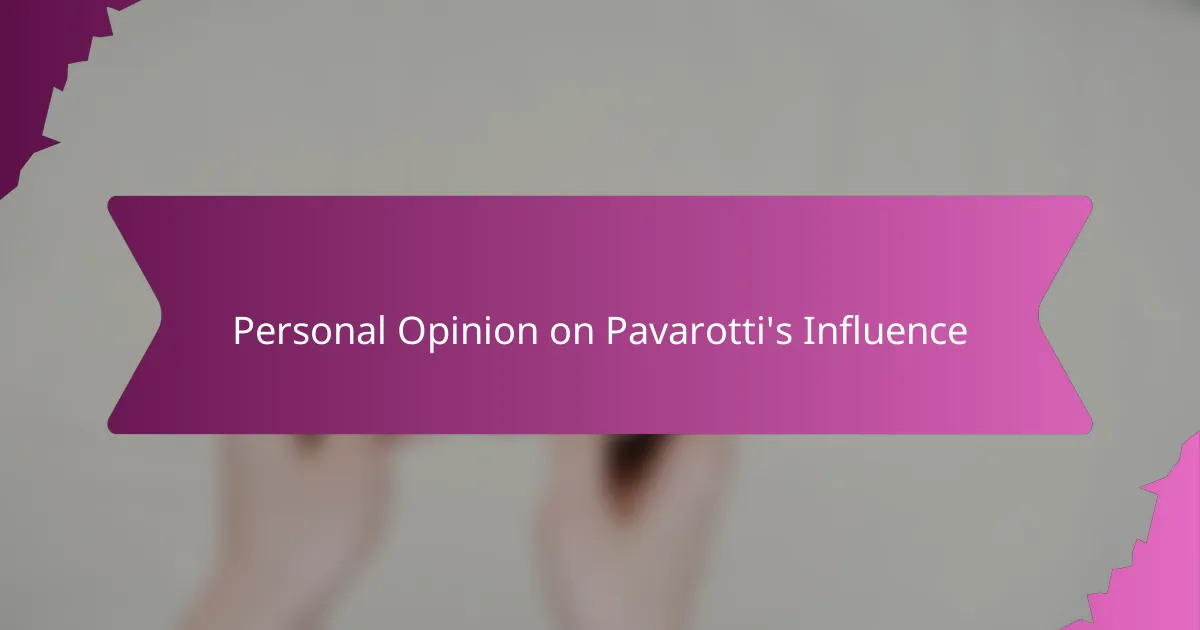
Personal Opinion on Pavarotti’s Influence
When I think about Pavarotti’s influence, what strikes me most is how he transformed opera from something distant into something deeply personal. His voice had this way of breaking barriers, making you feel like you were sharing a moment with a storyteller rather than just watching a performer. Have you ever felt that sudden connection during a performance that made everything else fade away? That’s the kind of bond he created for me.
I also appreciate how Pavarotti inspired not just singers but entire music projects to aim higher emotionally. Watching or listening to his performances, I often sense a call to delve deeper into the music’s soul, pushing beyond flawless technique toward authentic expression. It’s like he reminded us that perfection isn’t just about hitting the notes—it’s about breathing life into them.
Lastly, I can’t help but reflect on how Pavarotti’s legacy encourages artists today to be bold and approachable. His ability to bring opera into the mainstream world shows me that art doesn’t lose meaning when it reaches a wider audience; instead, it gains new dimensions. Isn’t that a powerful lesson for anyone involved in creative projects? For me, it’s a call to make art that’s both profound and accessible.
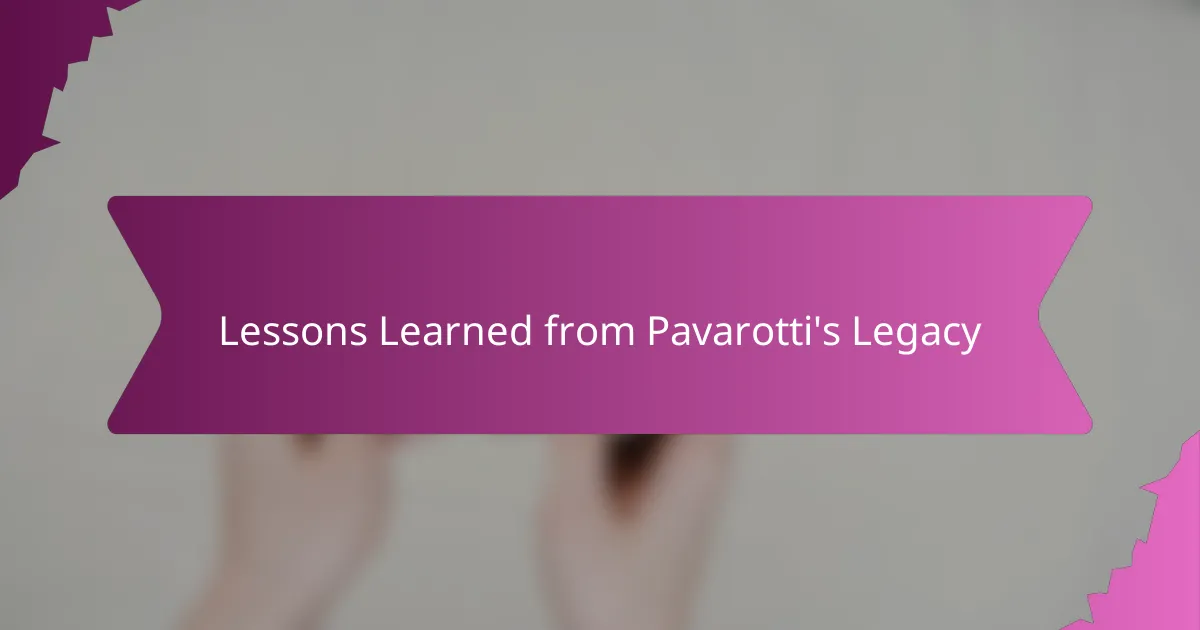
Lessons Learned from Pavarotti’s Legacy
Pavarotti taught me that true artistry in opera isn’t just about technical skill but about touching people’s hearts. I remember feeling moved by one of his recordings not because every note was perfect, but because his voice carried an undeniable warmth and sincerity. Have you ever encountered a performance that stayed with you long after it ended? That’s the kind of impact his legacy leaves.
Another lesson from Pavarotti’s journey is the importance of making opera approachable without diluting its depth. He showed me how bridging the gap between high art and popular culture can breathe fresh life into traditional forms. Isn’t it inspiring to think that innovation and respect for tradition can coexist so beautifully?
Finally, his example reminds me that passion and collaboration go hand in hand. Watching how his enthusiasm energized entire productions makes me believe that every music project benefits from that contagious spirit. Don’t we all want to create something that not only sounds great but feels alive?